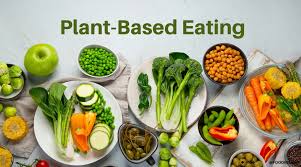The Benefits of a Plant-Based Diet
Switching to a plant-based diet has gained popularity in recent years, and for good reason. A plant-based diet focuses on consuming whole, minimally processed foods derived from plants, such as fruits, vegetables, nuts, seeds, grains, and legumes. Here are some compelling reasons why embracing a plant-based diet can have a positive impact on your health and the environment:
Health Benefits
Rich in Nutrients: Plant-based diets are abundant in essential vitamins, minerals, and antioxidants that are vital for overall health and well-being.
Heart Health: Studies have shown that plant-based diets can help lower cholesterol levels and reduce the risk of heart disease.
Weight Management: Plant-based diets are often lower in calories and saturated fats, making them an effective choice for weight management.
Environmental Benefits
Sustainable: Plant-based diets have a lower carbon footprint compared to animal-based diets, as they require fewer resources such as water and land to produce.
Biodiversity: By reducing the demand for animal products, plant-based diets help preserve biodiversity by decreasing deforestation and habitat destruction.
Tips for Transitioning to a Plant-Based Diet
If you’re considering transitioning to a plant-based diet, here are some tips to help you get started:
- Start Slowly: Gradually incorporate more plant-based meals into your diet to allow your taste buds and digestive system to adjust.
- Experiment with Recipes: Explore new recipes and cooking techniques to keep your meals exciting and delicious.
- Educate Yourself: Learn about the nutritional needs of a plant-based diet to ensure you’re getting all the essential nutrients your body requires.
- Seek Support: Connect with others who follow a plant-based lifestyle for advice, motivation, and recipe ideas.
In conclusion, adopting a plant-based diet can offer numerous benefits for both your health and the environment. By making conscious choices about the foods you consume, you can contribute to a healthier planet while improving your own well-being. Embrace the power of plants and discover the transformative effects of a plant-based lifestyle today!
Common Questions About Adopting a Plant-Based Diet
- Is a plant-based diet healthy?
- What foods are in a plant-based diet?
- What are the 30 plant-based foods?
- Are eggs part of a plant-based diet?
Is a plant-based diet healthy?
The question of whether a plant-based diet is healthy is a common one, and the answer is a resounding yes. A plant-based diet, rich in fruits, vegetables, whole grains, nuts, seeds, and legumes, provides an abundance of essential nutrients and antioxidants that are crucial for overall health. Numerous studies have shown that adopting a plant-based diet can help reduce the risk of chronic diseases such as heart disease, diabetes, and certain types of cancer. By focusing on whole, minimally processed foods derived from plants, individuals can enjoy improved health outcomes and a greater sense of well-being. Embracing a plant-based diet not only benefits personal health but also contributes to environmental sustainability and animal welfare.
What foods are in a plant-based diet?
A plant-based diet primarily consists of foods derived from plants, including fruits, vegetables, whole grains, nuts, seeds, legumes, and plant-based proteins such as tofu and tempeh. These nutrient-rich foods form the foundation of a plant-based diet and provide essential vitamins, minerals, antioxidants, and fibre that support overall health and well-being. By focusing on a diverse range of plant foods, individuals following a plant-based diet can enjoy a variety of flavours and textures while reaping the numerous health benefits associated with this sustainable and environmentally friendly way of eating.
What are the 30 plant-based foods?
When exploring a plant-based diet, it’s important to consider a diverse range of plant-based foods to ensure a well-rounded and nutritious eating plan. Some common examples of plant-based foods include fruits like berries, apples, and bananas; vegetables such as spinach, broccoli, and carrots; whole grains like quinoa, brown rice, and oats; legumes including lentils, chickpeas, and black beans; nuts such as almonds, walnuts, and cashews; seeds like chia seeds, flaxseeds, and pumpkin seeds. Incorporating these 30 plant-based foods into your diet can provide a rich source of essential nutrients while offering a variety of flavours and textures to enjoy on your plant-based journey.
Are eggs part of a plant-based diet?
Eggs are not considered part of a plant-based diet as they are derived from animals, specifically chickens. A plant-based diet focuses on consuming foods that come from plants, such as fruits, vegetables, grains, nuts, seeds, and legumes. While eggs are a rich source of protein and nutrients, they are not classified as plant-based due to their animal origin. Individuals following a strict plant-based diet typically avoid animal products, including eggs, in favour of plant-derived alternatives to meet their nutritional needs.

